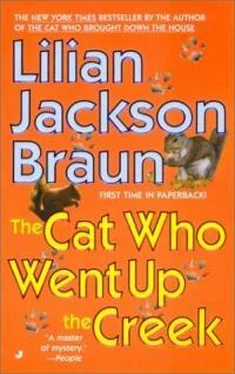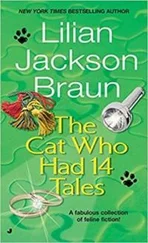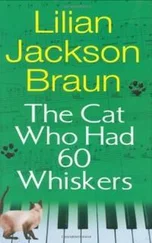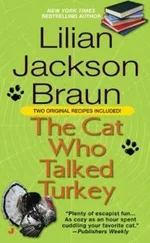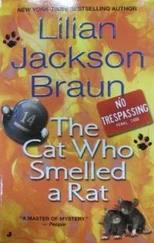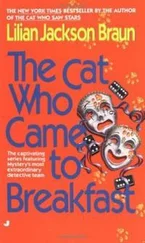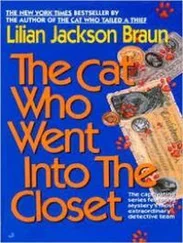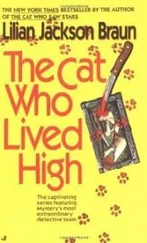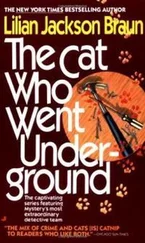“Were you able to learn anything about it?”
“A sticker on the back gives 1921 as the date and the name of a gallery in Amsterdam. It’s signed, but no one can make out the signature.”
It was a beach scene with the ocean in the background and the sand dotted with bathers and some beach chairs made of wicker and hooded for protection against the sun.
Qwilleran said, “I don’t see any sun worshippers, any bikinis, any frisbees or any Jet Skis.”
A small boy with a tin pail and shovel was sitting on the sand, digging, while a woman bent over him with motherly concern. She was wearing a blue dress with short full skirt and puffed sleeves—the focal point of the artwork—also a cloche hat and knee-high stockings.
Janelle said, “I showed it to some elderly women, and they said that was a bathing dress; the cloche was a rubber bathing hat; she was wearing bathing shoes and bathing stockings. That was how she took a dip in the waves. . . . But you haven’t heard the best part! I was living at home, and my mother let me hang my treasure in the living room. One day my grandfather visited us. He was born in the Netherlands, and he said, ‘I know that beach! I was there when the picture was painted! . . . That’s me digging in the sand! The woman in blue was my mother!’ Qwill, it gave me shivers! The woman in blue was my great-grandmother! Is that why the painting had such a powerful attraction for me in the gallery?”
“Hmmm,” he mused, tamping his moustache. “Amazing coincidence!” He lived with Koko; he knew all about amazing coincidence.
“Cuckoo! Cuckoo!” came a poorly timed comment from the main hall.
“Same to you!” he shouted over his shoulder. “Janelle, thanks for a thought-provoking story. It’ll run in my Friday space, and readers can come in to see the painting on Saturday.”
Another voice came from the main hall, “Ms. Van! Ms. Van! They spelled my name wrong on my booth!”
Janelle shrugged. Qwilleran saluted and left.
On the way home he stopped at the inn for mail and found two postcards from Polly. The first had a view of an early maritime village—and bad news:
Dear Qwill—Lost one of my good gold earrings! Looked everywhere! Retraced my steps! Can’t imagine how it happened. Sprained ankle—nothing serious!
Love from Polly
Qwilleran could imagine; she had been drinking navy grog; rum was not her drink. . . . The second card, mailed the next day, came from Sturbridge Village, showing a white colonial house with a horse and carriage at the door.
Dear Qwill—Delightful place! I could spend a week here! So peaceful! Picturesque farmhouses, meadows, split-rail fences. Walter found my earring!
Love from Polly
Qwilleran wondered why she had not mentioned where Walter found the earring. But he had other matters on his mind, such as what to write for the “Qwill Pen” column the next day. He thought he could write a thousand words on “Whiskers in the White House” . . . who, when and why . . . to shave or not to shave . . . the connection between war and facial hair . . . political influences . . .
He carried his typewriter to the porch and had inserted a sheet of paper when Yum Yum leaped up and landed like a feather, purring throatily. She was in one of her amorous moods, having followed him around and rubbed his ankles ever since he returned. Now she was going to monitor his typing, listening to the click of the keys, watching the carriage travel slowly across and then jerk back.
Half in kindliness and half in self-defense, he picked her up and walked back and forth, massaging her ears, nuzzling the back of her neck with his chin, whispering sweet words that he would not wish to have quoted. With a sudden grunt she jumped to the floor, walked to the kitchen for a drink of water, then settled down for a nap on the blue cushion. “Cats!” Qwilleran muttered as he returned to his typing. The click of keys resounded across the water, and a passing canoeist yelled a greeting. It was Doyle, going up the creek to disappear in a swamp, or be bitten by a rabid fox, or get clobbered by a bear, or suffer some other fate that his wife feared.
Soon after, Wendy herself came along the footpath, carrying books. She was not walking joyously as usual, but trudging.
He went out to meet her, and she held up two slim volumes. “I found some Trollope for you, Qwill. In the library at the inn. They said it was all right to take them.”
“That was very thoughtful of you. Will you come on the porch for a drink of fruit juice?”
“Nothing to drink, thanks, but I’d like to talk to you.” Her eyes had lost their sparkle. “I just came to apologize for the way Doyle and I argued at dinner last night.”
“Think nothing of it, Wendy. We all get hot under the collar once in a while.”
“What do you think about the danger in the woods?”
He had heard about poisonous snakes in the bogs and deer-ticks dropping off the trees, but—“You mentioned a friend who’s a forest ranger. Is she one of Dr. Abernethy’s daughters, by any chance?”
“Yes, I knew her in college, and it was her raving about Moose County that brought us up here—the natural beauty, the perfect summer weather, the slow pace—”
“But nothing about danger in the woods?”
“It wasn’t an issue. I didn’t know Doyle would be so determined to photograph bear cubs. . . . The trouble is, Qwill, I’m a worrier! I worry about my husband’s safety! You can’t tell a worrier to—just—stop—worrying. . . . We’ve been married only two years. We have plans for a family and a wonderful future! And to complicate matters, I’m supposed to avoid stress. I practice the rules of health and tranquillity, but then . . . something like this comes along, and I worry!”
Qwilleran was nodding and looking sympathetic and wondering what he could say.
“Well, if only you could say something to him! He’d listen to you! He has a lot of respect for you. And you live here . . .”
He was thinking fast; the obvious solution to a problem is not always the best. “I understand your distress, Wendy, and you have my utmost sympathy. I want to help, but there’s a wrong approach and a right approach. I need to think about it . . . and I will think about it . . .”
“I’d be so grateful!” She stood up. “You’re working. I’ll go home.”
He walked with her to the water’s edge. “I’ll be in touch. Thank you for the books.”
The titles were He Knew He Was Right and The Eustace Diamonds. Two of his favorites.
First he made some coffee and then lounged on a porch chair with his feet up. Koko hopped onto the foot of the lounge and sat tall in a businesslike way, his blue eyes brimming with helpfulness, as if he sensed a problem was being solved. The trick, Qwilleran decided, is to involve Doyle in something more interesting than Wendy’s Valley of Death. If nothing else, it would provide more time to study the problem. It could be something to flatter the photographer’s ego, or fulfill his primal urge to take pictures, or the fun of taking an assignment for the picture page of a small-town newspaper.
Qwilleran made three phone calls: to the managing editor, who had gone to the dentist; to the attorney, who was in conference with a client; to Bushland, who was out on assignment. He left urgent messages with all three.
Barter was the first to respond, and he listened to the proposition with keen interest.
“Did you see the opening of Bushy’s exhibit yesterday? Big crowd! And I happen to know there was an editor from a prominent publisher of art books there! We’ve been talking about having the K Fund publish his landscapes, and we’d better act quickly before he signs with another publisher . . . Also, we have a noted photographer of wildlife vacationing here and doing some extensive shooting. We should grab him, and do a large-format hardcover art book titled The Beauty of Moose County as photographed by Bushland and Underhill.”
Читать дальше
